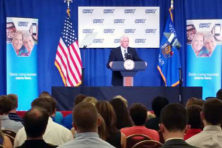State News: DNR Budget, Tax Cuts and Health Care
- Share
- Tweet
- Pin
- Share
DNR’s Budget Request at $560 Million
The Natural Resources Board met in Hayward Sept. 26 to take up several items, including the Wisconsin Department of Natural Resources’ request for the 2019-21 budget.
The agency has proposed a roughly $560 million budget for each year of the two-year budget. The proposed budget, a 1.7 percent increase from the last biennial budget, would go toward salaries and benefits.
The DNR is also asking to increase general bonding authority by about $7.1 million for the agency’s Safe Drinking Water Loan Program. The fund awards loans to communities to upgrade wastewater or drinking water facilities. In the last budget, the fund was awarded a $5.8 million increase.
A full agenda of the board’s meeting can be found on the DNR website.
Evers Says He’ll Prioritize Tax Cut for Neediest
Tony Evers, the state superintendent of public schools and Democratic gubernatorial candidate, says he wants to help more than 860,000 of Wisconsin’s neediest families with a tax break. But how he would fund those cuts is a fluid process.
Speaking at a Milwaukee Rotary Club event Tuesday, Evers cited an August United Way of Wisconsin report that found almost 40 percent of Wisconsin families struggled to pay for basic needs like transportation and child care.
Evers said giving these families a tax cut would boost the state’s economy more evenly. Funding these cuts, he said, is a matter of priorities.
“You go to the budget, you get the best you can and you try to do it without any taxes and it happens,” said Evers. “It happens every single time.”
Evers maintains the state can find saving in parts of government, including the Wisconsin Economic Development Corp., the state’s job creation agency, which Evers has vowed to eliminate and replace.
$47M for Local Roads Did Not Disappear
A miscommunication between the Wisconsin Department of Transportation and regional planning officials led to questions about whether $47 million in federal funding had disappeared from a local roads program.
The funding comes from the Federal Highway Administration to the Wisconsin DOT, which distributes it in funding cycles to the regional groups. The money is ultimately sent to city and county transportation officials.
It was estimated that Green Bay and Appleton were potentially missing $3 million each, Madison was missing nearly $7 million and Eau Claire’s County Highway Department was missing $186,000.
But soon after those questions showed up in news reports around the state, the DOT responded with a statement that none of the state’s metropolitan planning organizations lost or were going to lose their federal funding. The agency said an accounting change had caused confusion among local officials.
That confusion led state Sen. Robert Cowles, R-Green Bay, to ask the state’s nonpartisan Legislative Fiscal Bureau to get to the bottom of it.
The fiscal bureau issued a memo last Friday that confirmed the DOT’s claim that no money had disappeared and that the confusion stemmed from a June letter from the DOT that said due to a “delay” in the program that distributes the federal funding, the agency was “dropping fiscal year 2018” from a state funding cycle. In the fiscal bureau memo, analyst John Wilson-Tepeli wrote it appears some of the funding local officials expected to get in 2018 had been programed in the prior year’s cycle with the rest becoming available in 2019.
“In sum, despite the confusion surrounding the program changes described in this memorandum, and while some local projects may not be funded in the timeframe that local officials had expected, DOT indicates each … recipient should receive their total allocation amount over the schedule period,” wrote Wilson-Tepeli.
State Health Care Remains High Despite Ranking Dip
The quality of health care in Wisconsin has slipped a few notches, but the state still does well compared to other states when it comes to medical services provided in hospitals, nursing homes and doctor’s offices, according to a federal analysis.
Wisconsin overall ranked fourth in a report released Monday by the Agency for Healthcare Research and Quality. Maine ranked first. In last year’s report, Wisconsin ranked first in overall health care quality but was faulted for falls in nursing homes and how many children go to the hospital because of asthma.
Still, one area Wisconsin needs to improve is getting more people vaccinated against seasonal influenza, the report said. Last year, thousands went to the hospital with complications from the flu. In the 2017-18 flu season, 7,530 people were hospitalized. That’s twice as many as the previous year.
“That was a nationwide trend. There were records broken in almost every state, including Wisconsin,” said state Influenza Surveillance Coordinator Thomas Haupt.
Wisconsin Public Radio, © Copyright 2018, Board of Regents of the University of Wisconsin System and Wisconsin Educational Communications Board.

